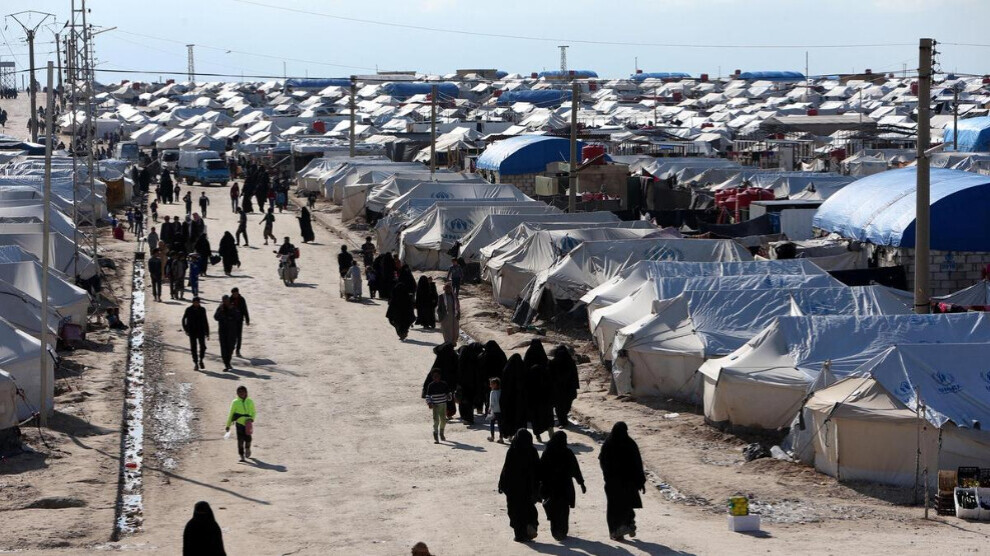International powers turn a blind eye to the ISIS issue
Experts warned that ISIS continued to threaten the world as international powers ignored the issue.
Experts warned that ISIS continued to threaten the world as international powers ignored the issue.

The ministerial meeting of the International Coalition Against ISIS, consisting of 85 states and organizations, was held in Riyadh, the capital of Saudi Arabia, on June 8. Foreign ministers of the member countries of the International Coalition also attended the meeting.
Although 9 years have passed since the establishment of the International Coalition, ISIS has not been eliminated completely. In a recent interview with Asharq Al-Awsat, the US Deputy Special Envoy for the International Coalition to Combat ISIS, Ian McCurry, denied that the war against the organization was over, even though it had become “more weak and scattered” than it was 5 or 10 years ago.
The Hol Refugee Camp, east of Hesekê city, and the Roj Camp in Qamishlo, close to the Iraqi border, are the most dangerous camps in the world. After the Syrian Democratic Forces (SDF) managed to end ISIS’ territorial rule on March 23, 2019, tens of thousands of families of the surrendered ISIS members were settled in these camps.
There are more than 54,390 Iraqi refugees and ISIS children and wives in the Hol camp. Despite the countless murders committed in the camp, ISIS families continue to maintain their extremist ideology.
'They are trying to build a state'
Speaking to ANHA, a researcher on terror organizations and journalist Lamara Arkendi stated that the ISIS threat continued despite the group’s weakening. Arkendi said: "All kinds of support are provided for ISIS to carry out its terrorist activities in the territories which formerly belonged to the Islamic state. The organization is trying to rebuild its state with this support.”
Arkendi insisted that the International Coalition should put more pressure on the governments and states from which ISIS mercenaries came and force them to ask for the extradition of their ISIS citizens and put them on trial.
Drawing attention to the dangers in the camps in North-East Syria, Arkendi said: “The international community or the governments of the countries where ISIS members came from have abandoned their citizens. But the greatest danger is that 60 or more children are born every month in the Hol refugee camp, yet there are no official documents regarding their identities. Those children are born with a fatwa issued by ISIS, which also legitimizes the marriage of 12-year-old children.”
Arkendi emphasized that many parties, including the Turkish state, benefited from the existence of ISIS.
'International powers do not do their duties'
Terrorism and international terrorist movements expert Munir Edib pointed out that the USA and its partners made a big mistake in the fight against ISIS. He said: “ISIS, which was established on June 29, 2014, could not be destroyed by air strikes. But it was defeated on March 23, 2019. It took five years to do that. For a very long time, the great powers could not destroy ISIS.”
“The ISIS threat is still there; it can still plan attacks in many places as it used to before,” he said.
Edib emphasized that although the coalition was formed 9 years ago, it did not fulfil its mission properly. He said: “They did not take sufficient steps to destroy ISIS due to different opinions or strategic goals. They were only carrying out air strikes, but there was no ground offensive.”
Edib remarked that the international community did not accept some refugees whose national identities were banned. He added: “Moreover, the USA did not have an international will to stop ISIS and destroy the camps that turned into ISIS strongholds. There are children in those camps, they have grown up as enemies of the state because they see themselves as prisoners.”
According to the data provided by the SDF, 19 thousand ISIS members are held in prisons in North and East Syria, of whom 7 thousand are foreign nationals, 12 thousand are Syrian and Iraqi nationals.
Edib said that some states wanted to cause confusion in other states by taking advantage of the political and economic presence of ISIS. He concluded: “Therefore, those states support ISIS. Now those states are known, so are their intentions. Their main goal is to establish a state for this organization. There are also states that support ISIS in order to take advantage of its existence. States that obtain oil products through smuggling are an example of this. ISIS is not over yet; it has been weakened, yet, it may revive again. Because the defeat of ISIS was geographical, they still maintain their extremist ideas and have a lot of supporters and fighters.”